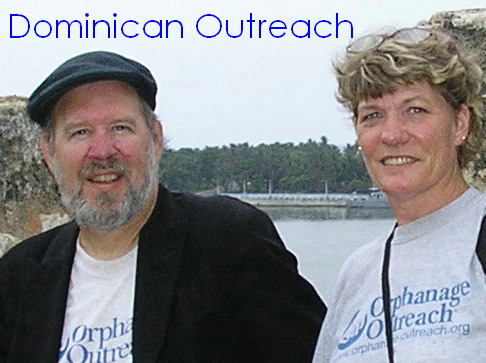
Does it Get Any Better?
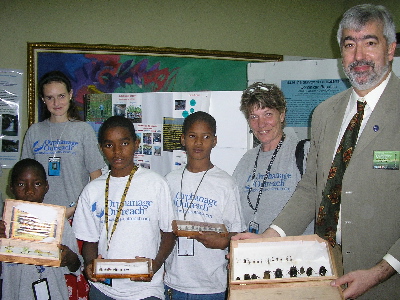
Dr. Brian Ferrell (right) honors insect work of our boys. (Left to right) Marcos Rodriguiz, Grace Helms (long term volunteer), Alex Rodriguiz, Andres Teneo,Marta Johnson
Three hundreds scientists from around the world rose to applaud to efforts of three boys from Good Samaritan Orphanage on January 28, 2005. They were introduced by famed entomologist from Harvard University, Dr. Brian Ferrell, at the end of his lecture to a packed room at Hotel Lina in Santa Domingo.
For nine months thirty boys from the orphanage have participated in an international insect project. They have collected over 500 specimens. Three or four of them may be candidates for new species.
It have been the dream of Dr. Ferrell to inspire children of the Dominican Republic to pursue careers in science. The boys of Good Samaritan Orphanage have pioneered this dream and for their efforts were the stars of the scientific conference. Dr. Ferrell showed a slide of the children and our boys stood to receive genuine applause and admiration.
At the end of the one hour lecture on the Evolution of Insects in the Carribbean, the children presented a scientific display of one hundred of their insects. They were asked many questions and scientists lined up to photograph the children.
Dr. Dan Perez from the Smithsonian in Washington D.C., an expert in grasshoppers took special interest in the work of the boys and spent time with the boys to show them techniques for pinning the insects. Also the boys were invited by a Fulbright scholar a an insect laboratory in San Pedro Macoris to be her special guests next month. Also Jake Kheel of a New York Foundation that funds science projects in the Dominican Republic invited the boys to visit and study for a few days at a laboritory in Punta Cana.
Next month, a team from the National Botanican Gardin in the DR, will come to the orphanage at give a two day workshop to the orphans and other interested individuals.
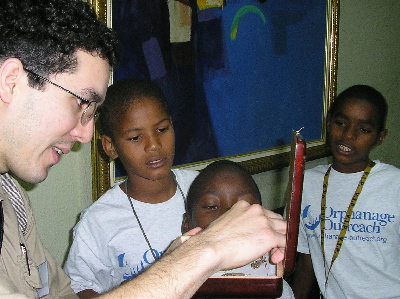
Graduate student, Sebastian, from Harvard University takes special interest in the insect collecion of Andres Teneo and Marcos Rodriguiz.
All of Dale's books are available at www.lulu.com/barhanna Books Relating to the Language of Jesus
Mailing Address: Snail Mail
Mailing address
(via the kindness of our friend):
Dale and Marta Johnson%
Leticia Minaya
Roman de Pina �35
Mao, Velverde, Republica Dominicana


January 30, 2005
Field report from Good Samaritan Orphanage, Dominican Republic
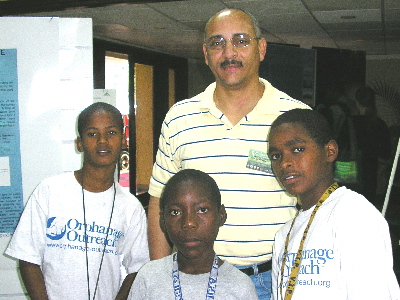
Dr. Daniel Perez of the Smithsonian praises orphans. (left to right) Andres Teno, Maros Rodriguiz, Dr. Daniel Perez, and Alex Rodriguiz
International Science Conference Honors Orphans
Recognition for the science work of the orphans of El Buen Samaritano may open doors for opportunities to children who excell in science. We have learned that some our our boys are on the path to receiving world class education through Harvard University that offers full scholarships to Domincan children who wish to pursue careers in science.
The long history of scientific exchange between the Caribbean and the Museum of Comparative Zoology (MCZ) at Harvard and neighboring institutions places Harvard University in a position to foster research and opportunities for children in this important biogeographic region. The Caribbean ranks in the top 4 of 25 biodiversity hotspots designated by Conservation International for their high proportions of endemic species. Research on Caribbean biodiversity is at an all-time high. Because the Caribbean is small relative to other hotspots, a digital encyclopedia of the species found there is within reach, especially with the help of the children of El Buen Samaritano in Esperanza.
The boys of El Buen Samaritano have been studying insect systematics that traditionally require students to make collections of local insect species to gain familiarity with the techniques of collecting, mounting, labeling and identifying insects to family level. These activities use the latest digital technology in an collaborative effort aimed at documenting and conserving biodiversity in a tropical setting-- the Dominican Republic. The students are assigned in teams to particular insect groups (e.g., beetles, moths, wasps) and digitize technical literature for use in the Dominican Republic (see Taxonomic Literature).The children have been invited to participate with the Departmento de Entomologia of the Museo Nacional de Historia Natural (MNHN) in Santo Domingo and the extraordinary field station in Punta Cana where state-of-the-art technology permit students to pursue service learning opportunities in the cause of biodiversity studies and conservation.
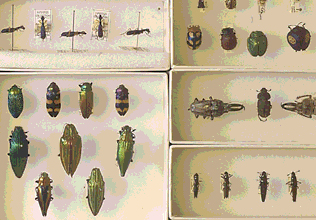
Dale and Marta Johnson,
Send contributions to Orphanage Outreach,
atten. Dale and Marta
6111 Robert E. Lee Street,
Glendale, AZ 85308 or pay by major credit card through Pay Pal. Click below




